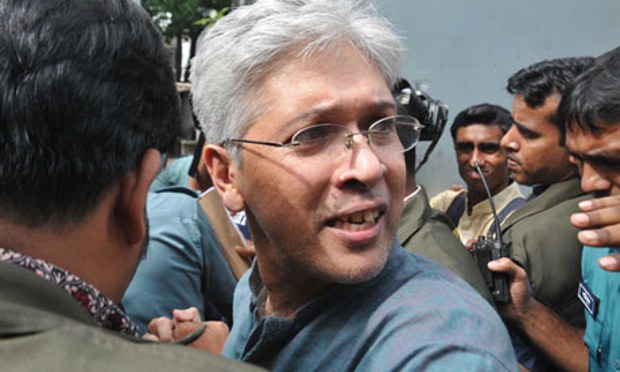Malaysia Bars Entry to Bangladeshi Human Rights Activist
2017.07.20
Kuala Lumpur and Dhaka
 Bangladeshi human rights activist Adilur Rahman Khan is pictured as police arrest him from his home in Dhaka on suspicion of publishing “false images and information,” Aug. 10, 2013.
Bangladeshi human rights activist Adilur Rahman Khan is pictured as police arrest him from his home in Dhaka on suspicion of publishing “false images and information,” Aug. 10, 2013.
Malaysian authorities barred a prominent Bangladeshi activist from entering the country on Thursday and put him on a flight back to Dhaka after reportedly holding him for hours, in an incident that outraged human rights advocates.
Adilur Rahman Khan, a lawyer and secretary general of the Bangladeshi rights advocacy group Odhikar, was denied entry at Kuala Lumpur International Airport when he disembarked from a Malaysia Airlines flight from Dhaka, according to Malaysian immigration officials. They offered no explanation other than saying he was blacklisted from entering the country.
The incident marked the second case in a month of Malaysian immigration officials barring entry to and turning back a foreign human rights activist, according to the local chapter of Amnesty International.
In a statement issued late Thursday (local time), the Malaysian immigration department said that officials found Khan’s name on a list of foreigners banned from entering Malaysia, and he was deported at 8:05 p.m. that evening.
Khan’s name “appeared in reference of an enforcement agency,” the statement said. “Immigration department consulted the enforcement agency and the subject had been recommended to be denied entry.”
Khan “was not arrested but denied entry” and had been “treated well while waiting for the airline to arrange his flight back to Bangladesh,” it added.
Khan, a former deputy attorney-general in Bangladesh, was due to speak at a two-day conference organized by the Anti-Death Penalty Asia Network (ADPAN) in Malaysia.
He landed back in Dhaka safely before midnight on Thursday (local time), said Odhikar coordinator Sajjad Hossain, who met Khan at the airport. Khan declined to make any statement upon his arrival, Hossain said.
‘Embarrassment to Malaysia’
The human rights group Voice of the Malaysian People – better known as Suaram – condemned Khan’s “detention” at the Kuala Lumpur airport and called on the Malaysian government “to stop the persistent harassment against human rights defenders” visiting the country.
Odhikar officials, who requested anonymity, told BenarNews that Malaysian authorities may have seen Khan as a security threat because of his activities as a human-rights lawyer in Bangladesh.
They said Khan, who founded Odhikar in 1994, had carried out extensive fact-finding missions into human rights violations in Bangladesh.
In August 2013, Bangladeshi police arrested him on charges of “fabricating information” about heavy-handed tactics used by government security forces in breaking up a protest carried out in Dhaka by Hefazat-e-Islam, a conservative Muslim group. Khan denied the charges.
After that arrest, Human Rights Watch (HRW) Asia Director Brad Adams said Khan had “been a strong critic of each of the past governments and has been threatened and followed for a long time. We are concerned for his safety. It appears he is being persecuted for his criticism of the current government.”
According to other rights groups, Khan and his colleagues have been previously harassed, intimidated and followed closely by Bangladeshi authorities for publicly criticizing alleged police brutality.
Khan, a recipient of human rights awards, has campaigned against torture, extrajudicial killings, enforced disappearances, and violence against women and minorities in Bangladesh.
The Malaysian grassroots movement Bersih, which has organized massive street demonstrations calling for transparent government, described Khan’s treatment on Thursday “as an embarrassment to Malaysia on the world stage.”
“Given his recognized dedication to the promotion of human rights and democracy, such an individual should be welcomed to share his experiences and knowledge, instead of being treated as a threat to national security,” Bersih said in a statement.
According to Odhikar’s website, the NGO helps monitor and raise awareness about rights abuses in Bangladesh and has trained more than 500 Bangladeshis to become human rights defenders.
A trend
Amnesty International Malaysia (AIM) also criticized Khan’s deportation, saying he was the “latest target” of a growing trend to impose travel bans on rights activists entering Malaysia.
“We call for an end to the use of travel bans against human-rights defenders, which further stigmatizes their work, and limits their ties with the global human rights movement,” AIM Director K. Shamini Darshni said in a statement.
On June 18, immigration officers barred Singaporean human rights defender Han Hui Hui from entering Malaysia.
She was held for several hours and deported after she was listed as an “undesirable immigrant” by the Malaysian Home Ministry.
Han was to attend a regional youth-exchange program organized by Suaram.
Han had not encountered any problems entering Malaysia in her five previous visits from April 2015 to March this year, officials told BenarNews.
Back in her home country, Han had actively campaigned to promote government transparency and accountability.
Other activists that Malaysia has previously barred from entering include Hong Kong’s Joshua Wong, as well as Indonesian human rights defender Mugiyanto Sipin, in May 2015 and January 2016, respectively.
Malaysian authorities had also introduced a policy that bans its citizens who discredit or ridicule the government from traveling abroad, according to a local newspaper, drawing criticism from civil liberty advocates. Maria Chin Abdullah, the chairwoman of Bersih, is among those critics banned from traveling abroad.
“Anyone who runs down the government or smears the government in any manner will be barred from going abroad,” a source in the immigration department told The Star newspaper in May 2016.
Former Immigration Director General Sakib Kusmi confirmed the existence of the new policy, saying that owning a passport was “a privilege and not a right.”
Malaysia’s Court of Appeal, the country’s second-highest tribunal, had ruled earlier this month that the government had the right to bar any citizen from traveling abroad.
Hata Wahari in Kuala Lumpur contributed to this report.







